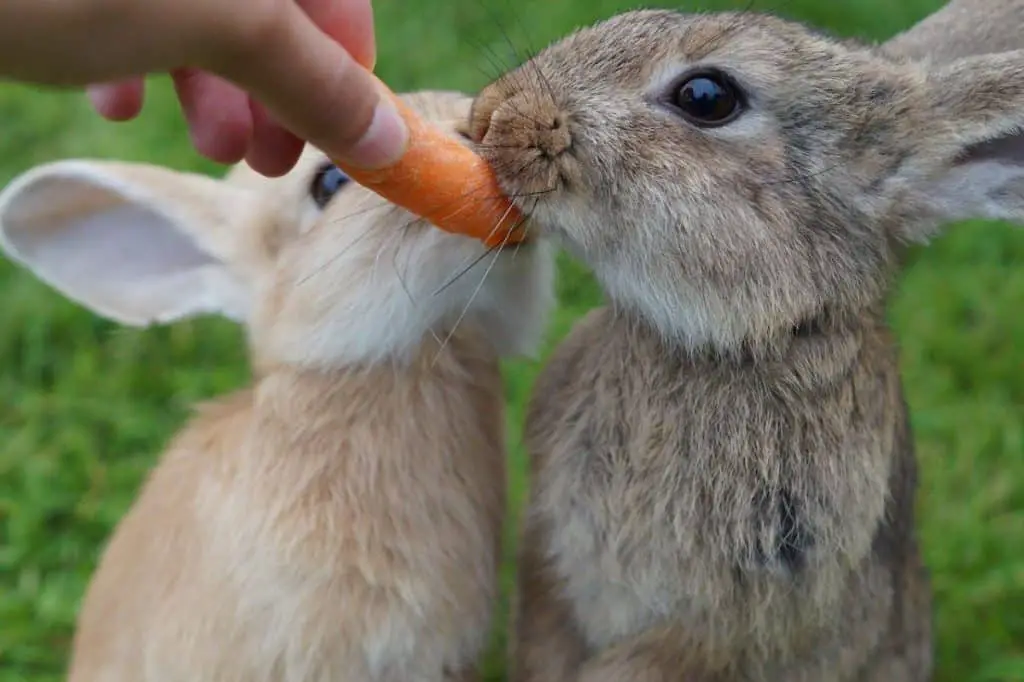Disclosure: We may earn money or products from the companies mentioned in this post.
Over the years our bunny family has experienced nearly every possible rabbit behavior including ear biting. For new pet bunny owners, seeing your rabbit bite or nibble on their own ears or the ears of other rabbits is scary. In this article, we’ll explore the causes of rabbit ear-biting and ways to stop it.
Let’s start with the basics.
While not common, sometimes rabbits begin to bite and nibble on their own ears and the ears of other bunnies. This behavior can begin for several reasons: aggression, anxiety, hormones, ear mites, and more.
Any rabbit can bite their own ears, not just lop-eared rabbits. Even bunnies with short ears regularly pull those ears toward their mouth when self-grooming so If they got the urge, they could easily chew on their own ears.
We’ll go into greater detail about all the potential causes in a bit.
The Dangers of Rabbit Ear Biting
Rabbit ear biting is usually harmless as the biting takes the form of nibbles and nips. However, it can progress to chewing and lead to the loss of portions of the bunny’s ear which introduces the potential danger of infection which can be life-threatening.
If you see your bunny begin to nibble on its own ears or the ears of other rabbits, you should try to get to the root cause of the behavior before it progresses.
If you see that your bunny has actually caused the ear to bleed, then you need to monitor that would for signs of infection which include a spreading redness, swelling, warmer ear, or seeping wound. If you see any of these signs of infection, you should quickly get your rabbit to a veterinarian.

11 Reasons Rabbits Bite Ears
1. Superiority Complex
There is no doubt that rabbits differ in personalities because of their breed, genes, and environmental adaptation. The American Rabbit Breeders Association has recognized 50 different breeds of rabbits and each of those breeds has different personalities.
While all rabbits are prey animals and tend to be pretty docile, some bunnies have a more aggressive personality. As a matter of fact, some rabbits can be downright fierce, dominant, and rather wild personalities. Other rabbits can be very docile, even to the point of being submissive to other rabbits.
If rabbits with these very different personalities live in one place, the rabbits with a dominating nature will probably bully the submissive bunny including biting on that rabbit’s ears.
Some adult rabbits have an authoritative disposition and might dominate younger rabbits by chewing their ears.
2. Loneliness
Like every other living being, rabbits feel loneliness. If a rabbit has been alone for a long time without interaction with fellow rabbits or even humans, it may actually be suffering from depression.
In such situations, rabbits become sullen and unhappy. This misery sometimes provokes them to commit self-injury. Stressed and lonely rabbits not only try to bite others but start to chew their body parts, especially their ears.
3. Hormonal Changes
We have observed many behavioral changes in our rabbits when they approach the age of sexual maturity. Male rabbits experience hormonal changes about 3-4 months after their birth. While female rabbits undergo hormonal changes between the age of 5 to 6 months.
These hormonal changes can induce aggressiveness in both male rabbits and females. This naturally increased aggression can change the way your bunny interacts with other rabbits.
4. Stress or Anxiety
It has been researched that psychologically and physically distressed rabbits are prone to bite their ears and about anything else they can reach.
Rabbits are timid animals and a lot of things can cause them stress or anxiety including illness, injury, fear, unsuitable accommodation, loneliness, an insufficient diet.
5. Overgrooming
Being a rabbit owner, you are undoubtedly aware of a rabbit’s meticulous grooming habits. Rabbits are are very clean animals and they achieve this by spending hours every day cleaning themselves.
But sometimes rabbits overgrooming. When overgrooming their normal licks and nibbles become more aggressive and can actually cause hair loss or sores.
Boredom is the chief reason for overgrooming, though it can also be caused by a dirty cage or even stress and anxiety as discussed above.
6. Ear Mites
Ear mites are a common infestation in the ears of rabbits. Ear mites are very contagious and rabbits are very prone to it and catch it easily. It causes itchiness, redness, rashes, and lots of discomfort in and around your bunny’s ear.
Rabbits with ear mites will itch at their ears either with their paws or by biting with their teeth. This can even lead to ear cankers which can be a serious condition and require treatment by your rabbit veterinarian.
7. Excitement
This sounds a little crazy, but I’ve seen long-eared (lopped) rabbits pick up their ear in their mouth when running and binking. They can bite too hard in their excitement and actually draw blood on their ear when their intent was never to bite.
8. Flea Bites
Rabbits do get fleas, and fleas can deliver painful and itchy bites that your bunny will respond to by nibbling at the bites and even biting their own body to try to get rid of the fleas.
If you suspect that your rabbit has fleas, you’ll want to treat the rabbit fleas quickly to avoid them infesting your entire home.
9. Ear Infection
Rabbits, like all animals, sometimes get ear infections which will cause them to scratch and bite their own ears.
Signs that your rabbit has an ear infection include head tilting, walking in circles, a floppy ear (assuming they normally have upright ears), debris or dirt in the ears, and loss of balance.
If you suspect that your rabbit has an ear infection, you should have your bunny vet treat the condition.
10. Something In Their Ear
Just like when you get something in your ear, when it happens to your bunny it itches and causes discomfort which can lead to chewing on the ear.
Things that can get into a rabbit’s ear include insects (e.g. earwigs or ants), water, and dirt and debris.
11. Poor Nutrition
If your rabbit isn’t eating a proper rabbit diet, their malnutrition can manifest in many issues including itchy skin or ears.

9 Ways To Stop A Rabbit From Biting Ears
With there being so many causes for rabbits starting to bite ears, there are obviously many things that might stop your rabbit from biting ears. Below I’m going to detail the most common solutions.
1. Isolate the Aggressive Rabbit
As we talked about above, some rabbits are more aggressive than other rabbits and they can be bullies
If this is the case with your rabbits, then your only solution is to isolate the aggressive rabbit from the more timid bunnies.
If you’re completely sure which bunny is the biter, you may need to invest in a pet camera { Click here to see the recommended camera on Amazon >>> } to identify the actual cause.
Once you find the guilty rabbit, isolate him from the herd. Keep in mind that complete isolation can make him more fierce and crazy. He must interact with others at least once a week but only under close supervision.
3. Separate Hutch for Baby Rabbits
Baby rabbits need their mother, but they should not be kept with other adult rabbits.
4. Clean Your Rabbits Ears Regularly
Many of the causes of ear-biting are related to the health of your rabbit’s ears and one of the best ways to maintain good rabbit ear health is to regularly inspect and clean their ears.
5. Provide Friendly and Cheerful Environment
We know that fear, frustration, and uneasiness can make rabbits harm themselves. These little animals need the same nurturing as human children. They need their space while eating, sleeping, playing, jumping, digging, thumping, and in all of their habitual acts.
Give your bunny an environment where they feel safe and that isn’t filled with unexpected noises or intruders. If you have another pet that sees your bunny as prey, keep them well separated.
6. Spaying and Neutering of Rabbits
Hormonal changes in mature rabbits can make them aggressive during mating season and make ear-biting much more likely. When rabbits attain the gain of majority, spaying and neutering should be considered for the health of your bunny.
Spaying is for the female rabbits and neutering is for the male rabbits. One of the biggest advantages is that after spaying and neutering, rabbits attain a relaxed disposition. They usually become even more friendly and the chances of developing many ailments are reduced. As a bonus, having your rabbit spayed or neutered usually eliminates urine spraying and keeps your carpets and hardwood floors free of rabbit pee stains.
7. Comfort & Bond With Your Rabbit
Stroking and petting are the acts that build trust between the owner and the pet. Rabbits sometimes develop the habit of biting their ears when they are nervous and scared. Your assurance by petting will keep them away from nipping their ears.
8. Provide Creative Games to Stay Attentive
Boredom causes the overgrooming in rabbits, and by doing so they scratch, bruise, and cut their ears. To divert their attention from overgrooming, play different games with them.
Etsy has some great ‘mind games’ for pet bunnies, and I’ve collected the best in this article.
9. Clean To Prevent Insects
Mites present in the hutch, food bowls, bedding cause infectious ear mites in rabbits. It spreads from one rabbit to another nearly instantly.
Regularly clean the hutch thoroughly. Discard all bedding if you find even a single mite and keep the infested rabbit far away from others…probably in another building!
Rabbit’s Ears Regrow
You are probably not going to believe this…
Research has proven that rabbits can regrow small wounds in their ears. Rabbits are unique among mammals with this regeneration ability. This healing most often happens with holes in a bunnies ear, not with a bite out of the edge. The regeneration happens within two months.
So don’t count out regeneration, but it is possible! Crazy huh?
Even if the bite out of your rabbit’s ear doesn’t regenerate, it will likely heal and give your bunny a unique scar that you can make up a great story about.
Personally, I prefer to tell my friends about the time that my bun fought off a knife-wielding burglar and lost that tiny little piece of the ear in the process. 😉
I hope you found the information you needed in this rabbit article. If not, be sure to join our group of rabbit friends on Facebook and someone there will help you out!
~Stacey

Hello. I Have 3 male rabbits. Two black ones that are brothers and another who is 3 months younger and is a Lion Lop rabbit. All three are already neutered but I am still waiting a bit before allowing them to be together. The Alpha of the group which is one of the black brothers (Ozzy) treated the other black rabbit (Staples) poorly before, they have gotten together and made amends as of now and the current problem is that Staples is now the one being agressive towards the younger of the three which is the Lion Lop. Staples was eating the ear of the younger in front of me when I was petting all of them. It was awful. How can i avoid it from happening again?